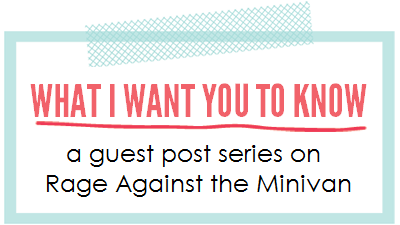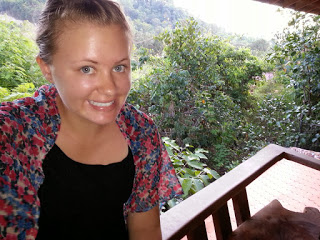What I Want You to Know is a series of reader submissions. It is an attempt to allow people to tell their personal stories, in the hopes of bringing greater compassion to the unique issues each of us face. If you would like to submit a story to this series, click here. Today’s guest post is by Lacey.
I first began self-harming, through cutting myselfwhen I was 18. I was already dealing with depression, anxiety, and bulimia, when self-harm came onto the scene, as well as working through the aftermath of childhood sexual abuse. If I truly look back though, the tendency to self-harm started at a very young age for me, such as in primary school when I began pulling out all of my eyelashes, and punching myself as I lay in bed at night.
Self-harm has gained much attention in recent years, although the understanding of it is still incredibly lacking. My experience of self-harm was not for attention-seeking, and nor was it a indicator of suicidality. Rather, I used it as a coping mechanism in order to deal with everything happening in my life at the time. Whilst not a healthy way of coping, it was all I had at the time, and it worked; it kept me alive.
Eventually though, I was at a healthier place and receiving support and I was actually able to develop some healthy coping strategies, rather than cutting myself any time I was feeling anxious or numb or overwhelmed. I was able to choose life in other ways that weren’t so self-destructive.
What I found during that time of recovery though, is that self-harm is habitual and addictive. Breaking the habit was crazy hard, even though I didn’t necessarily need the release that it provided anymore. And as with many addictions, when I stopped harming, my bulimia increased in severity to fill the void.
As someone with this history, I now walk around with scars criss-crossing my thighs, and shorts or skirts above the knee will often bring stares or questioning looks. It usually works one of two ways – either the person makes a comment about concerns for my mental health (despite it being obvious that may scars are all healed and years old), or they totally ignore what they’ve seen, but the elephant in the room grows. Oh how I wish that people would feel comfortable with asking me about my story or even just acknowledging that I have walked through some hard stuff, rather than awkwardly standing there in silence whilst sneaking glances at the scars.
I know that self-harm is incredibly hard to understand. Sometimes I even struggle to understand it myself. I know that it’s inconceivable to most people that harming myself could have actually helped me cope with life and helped me to self-soothe. It’s hard for the concept of self-harm to be separated from the belief that this must be a suicidal gesture or a way of seeking attention. Self-harm carries with it so much shame and silence and stigma, which is why I have the passion to now speak out and bring awareness to it.
And the reality is that the old coping strategies that kept me going for so long, are sometimes the first ones to pop to mind when I’m feeling overwhelmed or stressed or down. I have to constantly remind myself of better options, and stop myself from squeezing my nails into my skin to feel better. Although I truly feel freed of self-harm and the place I used to be at, the ghosts of the addiction linger, and it’s a daily choice to find better and healthier ways to cope.
Now I look back over those times of darkness and struggle and am thankful that I got through that alive. I am also thankful for the empathy and understanding this has given me to be able to work with others who are walking that journey. I feel honoured to have insight and a little understanding of the journeys that so many others face, often in silence. And I know the power of breaking that silence and stigma from having so many people share to me for the first time about their experiences too.
Self-harm has gained much attention in recent years, although the understanding of it is still incredibly lacking. My experience of self-harm was not for attention-seeking, and nor was it a indicator of suicidality. Rather, I used it as a coping mechanism in order to deal with everything happening in my life at the time. Whilst not a healthy way of coping, it was all I had at the time, and it worked; it kept me alive.
Eventually though, I was at a healthier place and receiving support and I was actually able to develop some healthy coping strategies, rather than cutting myself any time I was feeling anxious or numb or overwhelmed. I was able to choose life in other ways that weren’t so self-destructive.
What I found during that time of recovery though, is that self-harm is habitual and addictive. Breaking the habit was crazy hard, even though I didn’t necessarily need the release that it provided anymore. And as with many addictions, when I stopped harming, my bulimia increased in severity to fill the void.
As someone with this history, I now walk around with scars criss-crossing my thighs, and shorts or skirts above the knee will often bring stares or questioning looks. It usually works one of two ways – either the person makes a comment about concerns for my mental health (despite it being obvious that may scars are all healed and years old), or they totally ignore what they’ve seen, but the elephant in the room grows. Oh how I wish that people would feel comfortable with asking me about my story or even just acknowledging that I have walked through some hard stuff, rather than awkwardly standing there in silence whilst sneaking glances at the scars.
I know that self-harm is incredibly hard to understand. Sometimes I even struggle to understand it myself. I know that it’s inconceivable to most people that harming myself could have actually helped me cope with life and helped me to self-soothe. It’s hard for the concept of self-harm to be separated from the belief that this must be a suicidal gesture or a way of seeking attention. Self-harm carries with it so much shame and silence and stigma, which is why I have the passion to now speak out and bring awareness to it.
And the reality is that the old coping strategies that kept me going for so long, are sometimes the first ones to pop to mind when I’m feeling overwhelmed or stressed or down. I have to constantly remind myself of better options, and stop myself from squeezing my nails into my skin to feel better. Although I truly feel freed of self-harm and the place I used to be at, the ghosts of the addiction linger, and it’s a daily choice to find better and healthier ways to cope.
Now I look back over those times of darkness and struggle and am thankful that I got through that alive. I am also thankful for the empathy and understanding this has given me to be able to work with others who are walking that journey. I feel honoured to have insight and a little understanding of the journeys that so many others face, often in silence. And I know the power of breaking that silence and stigma from having so many people share to me for the first time about their experiences too.
Please listen to stories and hear the experiences of those who face this struggle. Mine is one of many stories, and countless different experiences of self-harming. With awareness and empathy, shame will slowly retreat and voices will be heard.


